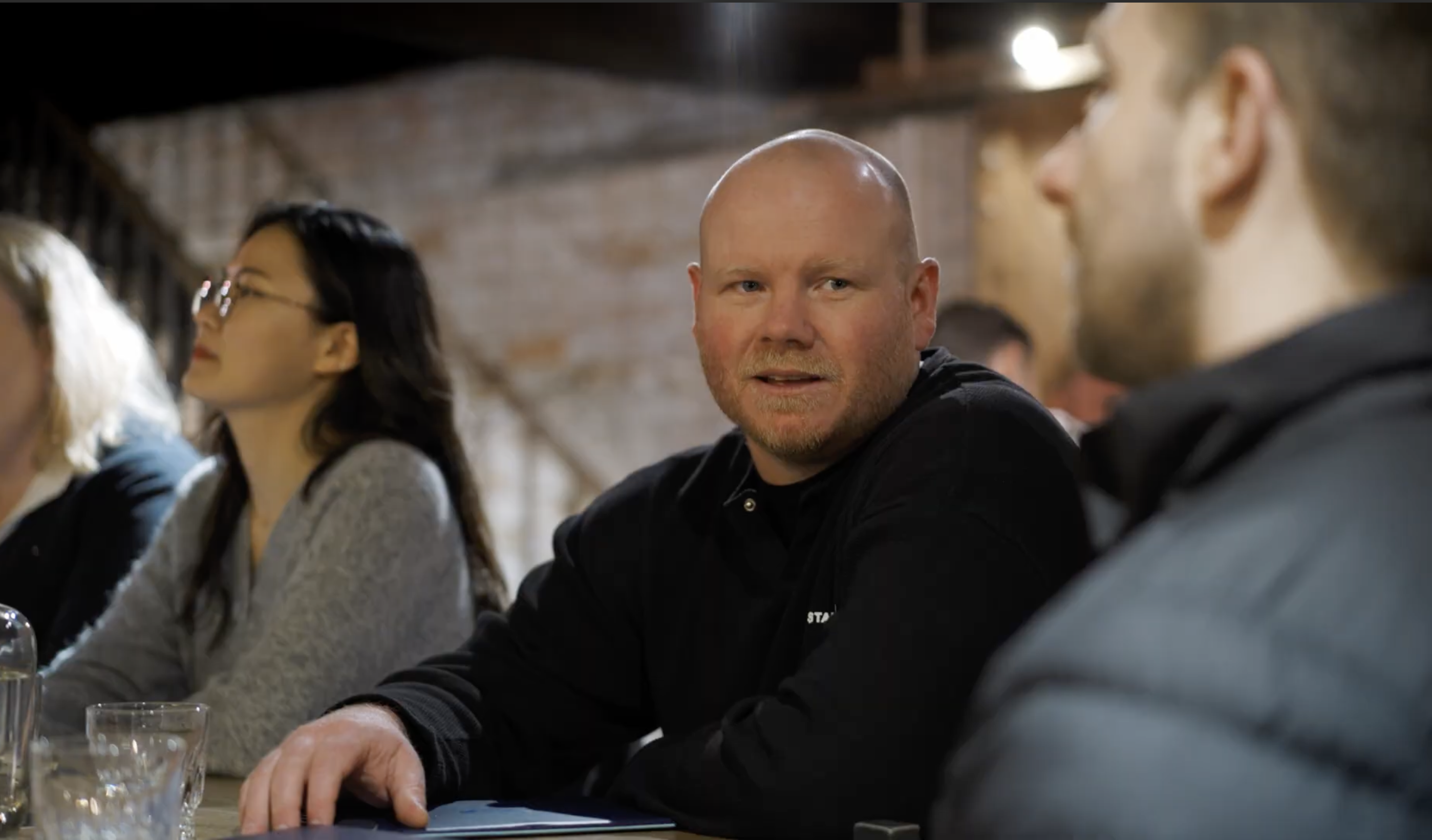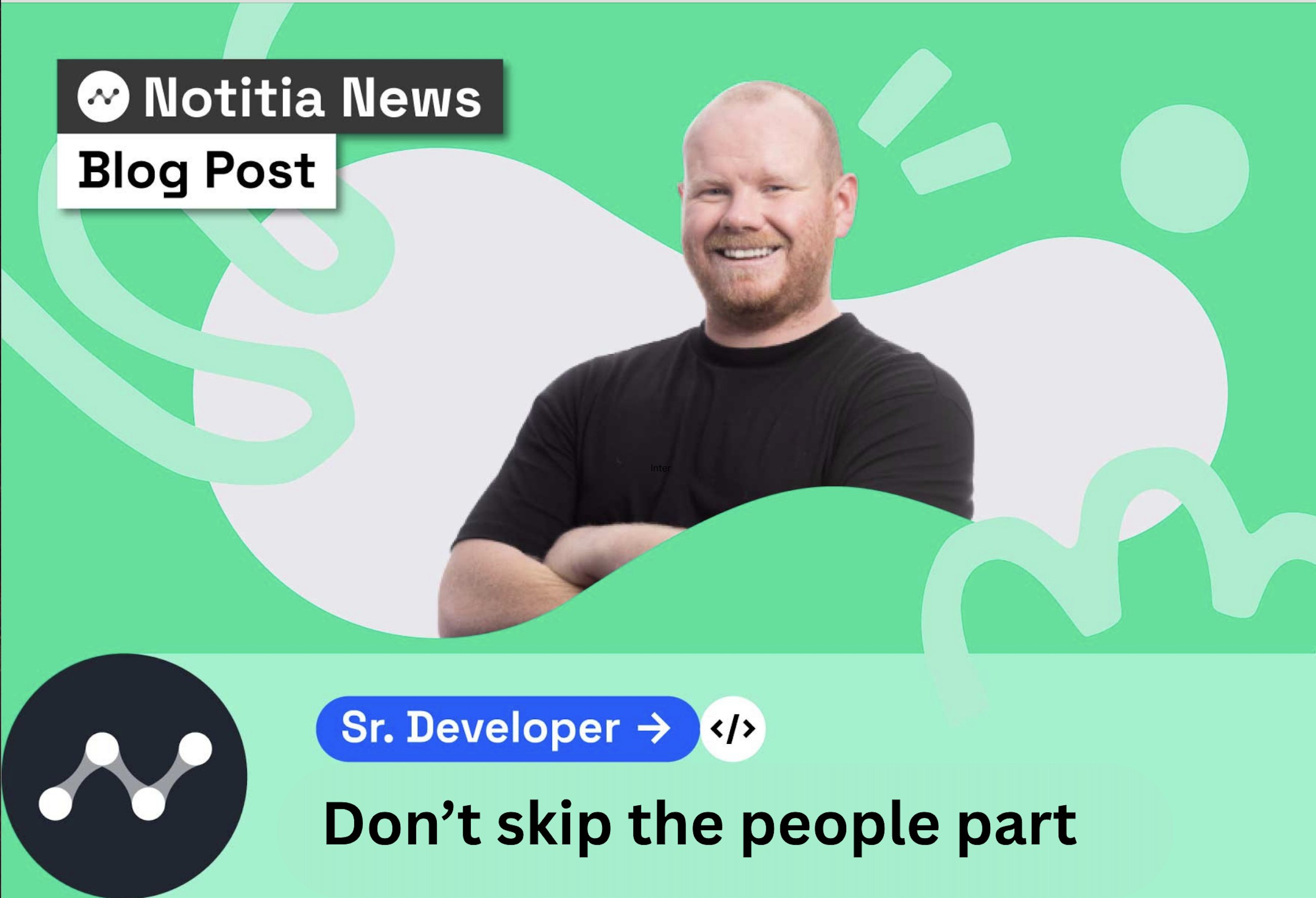How Relationships Shape Career Progression in Tech | Key Takeaways for Developers: Building Soft Skills | Opportunities Come From People
Notitia's Web Developer Team Lead, says the turning point in his career wasn’t another course or side project — it was learning how to work with people, build trust, and show up in the right circles. Non-coding skills and relationships has shaped Brett's career more than any framework or infrastructure update. This authored blog post by Notitia Senior Web Dev, Brett Earle ,breaks down why non-coding skills and networks matter more than you think.

I’ve spent a lot of time honing technical skills — frameworks, infrastructure, automation. But the longer I’ve been in the industry, the clearer it’s become that non-coding skills and relationships are just as critical as writing clean code.
The only reason I have this career is because I put the work in on becoming relevant and then went out to meet people within the industry. That part’s non-negotiable. You can’t sit in a silo and expect doors to open.
The way I see it, knowledge, career progression, product outcomes and opportunities are all team sports.
Knowledge isn’t built alone
Let’s start with knowledge. There’s a massive win in talking to people and getting advice on your chosen field. Perspective shifts don’t happen in a vacuum. I’ve had lightbulb moments just from hearing someone else describe a problem they were working on. Suddenly the thing I’d been stuck on made sense from another angle.
The things that cause problems or hold you back are often things you don’t even know you don’t know — the "unknown unknowns."
But when you listen to experienced people talk about their area of expertise, the space they "own", those blind spots can suddenly become clear.
It’s a shortcut you don’t get in docs or tutorial videos.
And none of that’s available to you if you can’t have that conversation, ask that question, or just show up as someone other people want to work with.
The best way to get these wins is to be versed in soft skills and grow your network — which, for me, really just means making friends in the industry.
Career progression doesn’t happen in isolation
Career progression doesn’t happen alone. At every turning point in my career, someone has advocated for me. Someone had my back when it counted — and that’s been worth way more than trying to talk up my own achievements to anyone who’ll listen.
Sure, you’ll hopefully have structured ways to do that — like performance reviews — where highlighting your wins is expected and appropriate. But the day-to-day stuff? That’s about building trust. Being helpful. Being reliable. Delivering what you said you’d deliver.
That’s how you build silent advocates. People who will mention your name in the right room, because they’ve seen you show up consistently and contribute.
Products aren’t just codebases
There’s also a mindset shift that took me a while: product doesn’t get delivered by a single person.
As devs, especially when you’re deep in technical systems, it’s easy to think the product *is* the system — the backend logic, the API, the way it scales or performs. But the actual product is much bigger than that.
At any real scale — or even between a few teams — each specialty has a significant role to play. There’s the person who sparked the idea in the first place. The product team who figured out how to shape the idea into something workable. The specialist teams who bring specific domain knowledge. The marketers who give it reach.
None of that works unless we can all actually collaborate, which is where soft skills come in again. If you’re the person in the corner who only sees things through a dev lens, it’s hard to contribute meaningfully to that bigger picture.
Opportunities come from people, not job boards
Let’s talk about opportunity. Most of the good things that have happened in my career haven’t come from applying cold to a job post. They’ve come from conversations, relationships, and being in the right room when someone said, “Hey — I know someone who could help with that.”
What does this mean in practice? Putting yourself in different circles — where real people are talking, solving, thinking.
One of the best things you can do is just be genuinely helpful. Not in a transactional way. Not because you expect something in return. Just because it’s the right way to show up.
Out there in the wild it looks like making genuine connections. Being available. Joining conversations. Sharing something you’ve learned. Helping someone debug something because you’ve been there too.
Over time, those small interactions stack up. You become someone people remember. And that’s where new projects, roles, or collaborations start to appear.
You don’t have to be loud — Just present
If all this sounds like I’m saying you need to become an extrovert, I’m not. I’m not the loudest voice in the room. I’m not pitching myself constantly. But I try to be consistent. Show up. Be useful. Be curious.
That’s enough to build momentum. That’s enough to make an impression.
Here’s what’s worked for me, and what I recommend to other devs who want to build more than just a GitHub history:
- Say yes to the meetup. You don’t need to talk to 20 people. One good conversation.
- Message someone you admire. Ask a question. Don’t pitch. Just be real.
- Be generous with what you know. You’d be surprised how often a small insight can be huge for someone else.
- Watch how others work. Not just what they build — how they collaborate, how they unblock others, how they share credit.
- Help without strings. It comes back. Not always directly, but it does.
Technical skills will get you in the door. But the things that sustain a career (that open up new work, new ideas, and new direction) are mostly human. If you want a career in tech that actually lasts, don’t just level up your stack. Level up how you connect.
Follow along for real talk on dev careers, team leadership, and working at the intersection of code and communication. I post when I’ve got something useful to say.






